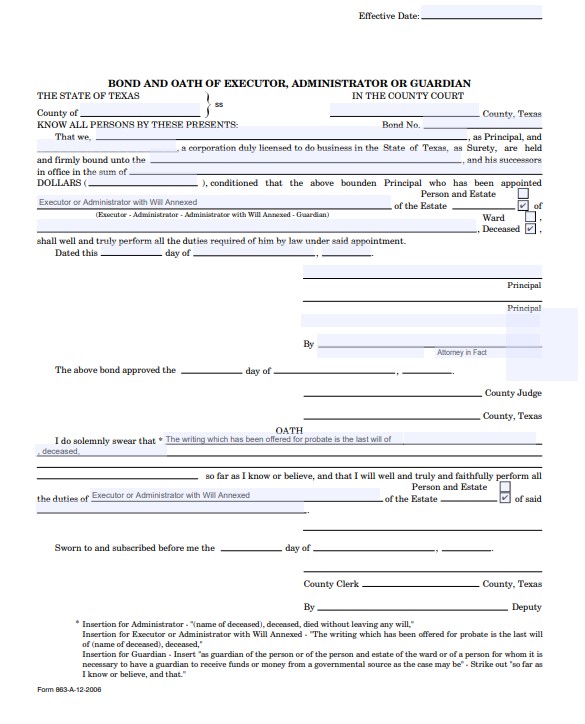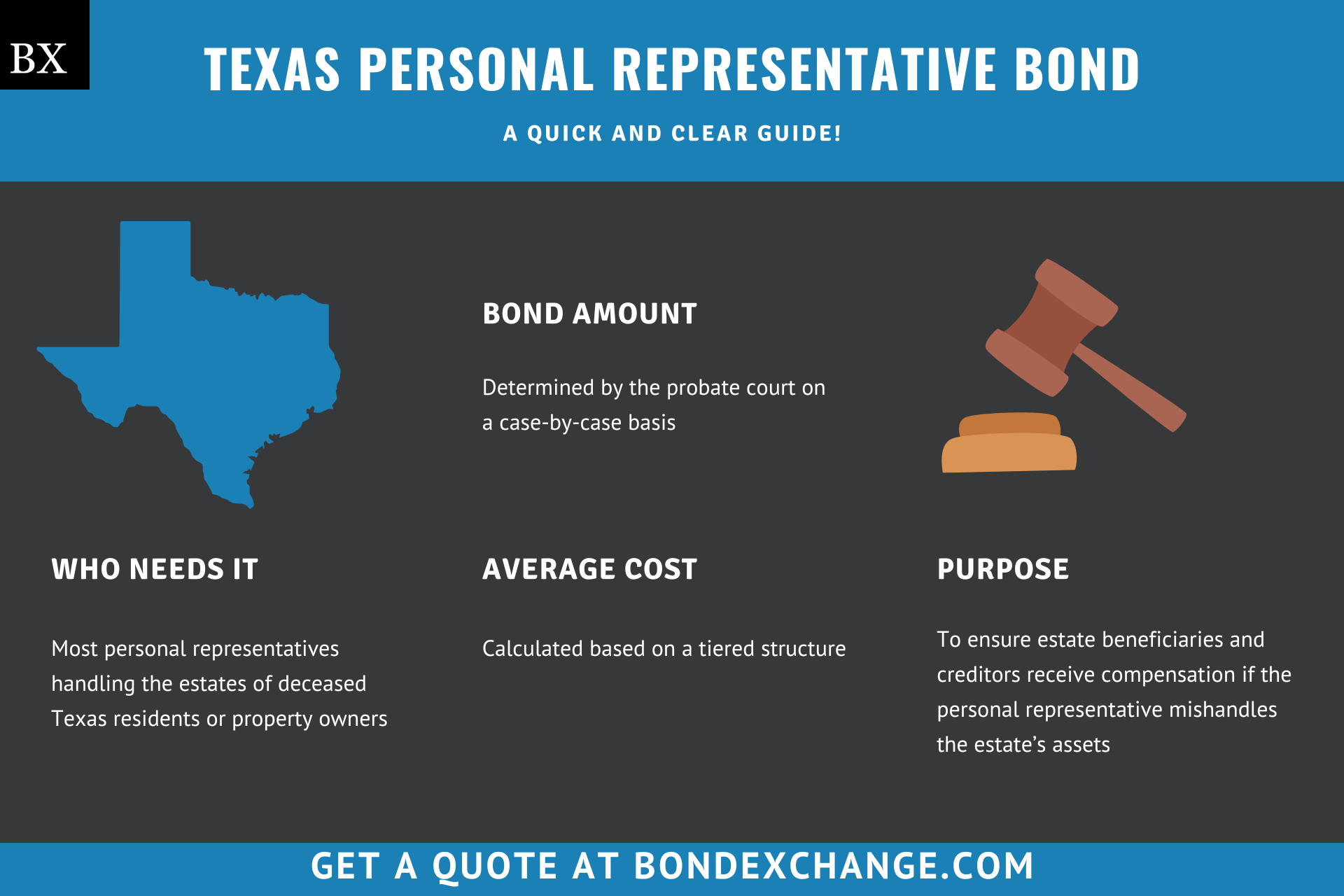Texas Personal Representative Bond: A Comprehensive Guide
This guide provides information for insurance agents to help their customers obtain a Texas Personal Representative bond.
At a Glance:
- Lowest Cost: Calculated based on a tiered structure
- Bond Amount: Determined on a case-by-case basis (more on this later)
- Who Needs it: Most personal representatives handling the estates of deceased Texas residents or property owners
- Purpose: To ensure estate beneficiaries and creditors receive compensation if the personal representative mishandles the estate’s assets
- Who Regulates Personal Representatives in Texas: The probate court with jurisdiction over where the deceased individual resided or had property

Background
Texas Statute 301.001 et seq. requires all personal representatives of an estate to be appointed by a court before assuming their fiduciary duties. The Texas legislature enacted the appointment requirement to ensure that personal representatives do not mismanage the estate’s assets. To provide financial security for the enforcement of this requirement, the court may require a personal representative to purchase a probate surety bond to be eligible for appointment.
What is the Purpose of the Texas Personal Representative Bond?
Texas requires personal representatives to purchase a surety bond as a prerequisite to being appointed as a fiduciary over an estate’s assets. The bond ensures that the estate’s beneficiaries and creditors will receive compensation for financial harm if the personal representative fails to abide by the regulations outlined in Texas Statute 305.101 et seq. Specifically, the bond protects beneficiaries and creditors if the personal representative mismanages the estate’s assets. In short, the bond is a type of insurance that protects the estate’s beneficiaries and creditors if the personal representative violates their fiduciary duties.
How Can an Insurance Agent Obtain a Texas Personal Representative Surety Bond?
BondExchange makes obtaining a Texas Personal Representative bond easy. Simply login to your account and use our keyword search to find the “Probate” bond in our database. Don’t have a login? Gain access now and let us help you satisfy your customers’ needs. Our friendly underwriting staff is available by phone (800) 438-1162, email or chat from 7:30 AM to 7:00 PM EST to assist you.
At BondExchange, our 40 years of experience, leading technology, and access to markets ensures that we have the knowledge and resources to provide your clients with fast and friendly service whether obtaining quotes or issuing bonds.
Not an agent? Then let us pair you with one!

Click the above image to find a BX Agent near you
How is the Bond Amount Determined?
Texas Statute 305.153 dictates that the judge of the probate court must set the bond in an amount equal to the estimated value of the estate’s personal property plus all interest, dividends, collectible claims, rental income, and the aggregate amount of any installments or periodic payments the estate is anticipated to generate over the next 12 months. The court will hold a hearing to determine the required bond amount. Additionally, the court may reduce the bond amount for all estate funds deposited in a financial institution located in Texas.
What are the Underwriting Requirements for the Texas Personal Representative Bond?
Most surety companies will examine the following factors when determining eligibility for the Texas Personal Representative bond:
- Personal representative’s credit history (not considered for bonds with limits less than $25,000)
- Whether or not the estate has an attorney (not considered for bonds with limits less than $25,000)
- How long the fiduciary appointment is for
- Whether or not the personal representative is replacing a prior fiduciary
- If the personal representative has ever committed a felony
- If there are disputes among the estate’s beneficiaries
- Whether or not there is any ongoing business in the estate
- If the bond is being required by a creditor
How Much Does the Texas Personal Representative Bond Cost?
Surety companies typically determine the premium rate for personal representative bonds based on a tiered structure. As a result, larger bond amounts will be charged a lower premium rate than smaller bonds.
The following table illustrates the pricing structure for the Texas Personal Representative bond:
$1,500,000 Personal Representative Bond Cost
| Bond Amount | Premium Rate | Total Bond Cost |
|---|---|---|
| First $20,000 | 0.75% | $150 |
| Next $40,000 | 0.60% | $240 |
| Next $140,000 | 0.50% | $700 |
| Next $300,000 | 0.375% | $1,125 |
| Next $1,000,000 | 0.25% | $2,500 |
| Total cost of $4,715 |
Who is Required to Purchase the Texas Personal Representative Bond?
Texas requires personal representatives to purchase a surety bond as a prerequisite to obtaining a fiduciary appointment. To paraphrase Texas Statute 22.031, a personal representative is a court-appointed fiduciary responsible for administering a deceased individual’s estate. Personal representatives are referred to as executors if the deceased individual nominated them in their will, or administrators if they were not nominated in the will or if no will exists.
Personal representatives are not required to purchase a bond if:
- The will explicitly waives the bond requirement and the court deems the personal representative qualified
- They are a corporate fiduciary

BondExchange now offers monthly pay-as-you-go subscriptions for surety bonds. Your customers are able to purchase their bonds on a monthly basis and cancel them anytime. Learn more here.
How do Personal Representatives Become Appointed in Texas?
Personal representatives in Texas must navigate several steps to become court-appointed fiduciaries. Below are the general guidelines, but applicants should refer to Texas’s probate statutes for details on the process.
Step 1 – Meet the Qualifications
Persons are ineligible for appointment as personal representatives if any of the below characteristics apply to them:
-
- Is incapacitated
- Is a felon that has not been pardoned or had their civil rights restored to them
- Is a nonresident of Texas and has not appointed an approved resident agent to accept service of process
- Is a corporation that is not authorized to act as a fiduciary in Texas
- Is found unsuitable by the court
Step 2 – Determine Priority
Priority for appointment as a personal representative will be granted in the following order:
-
- The persons named as executor in the deceased individual’s will
- Persons nominated by executors that are unable or unwilling to serve
- The surviving spouse
- The principle devisee (person receiving real estate) of the estate
- Any devisee of the estate
- The deceased’s next of kin
- Any creditor of the deceased
- Any person of good character residing in the same county as the court
- Any qualified person
- Appointed public probate administrators
Step 3 – Hire an Attorney
Although not explicitly required, it is highly recommended that personal representatives hire an attorney to assist with the probate process.
Step 4 – Contact the Probate Court
Persons that meet all qualifications and have priority must contact the probate court with jurisdiction over the estate to obtain their appointment. A representative of the court will walk the personal representative through the appointment process, provide them with all required forms, and answer any questions they may have. Personal representatives not explicitly nominated in the will (administrators) may have to undergo additional steps to receive their appointment.
Any person with an interest in the estate’s assets may file an objection to the appointment of the personal representative(s) and is entitled to a hearing to make their case.
Step 5 – Purchase a Surety Bond
Unless otherwise exempt, personal representatives must purchase and maintain a surety bond (limits outlined above).
How do Texas Personal Representatives File Their Bonds?
Personal representatives should submit their completed bond forms, including the power of attorney, to the probate court with jurisdiction over the estate.
The surety bond requires signatures from both the surety company that issues the bond and the personal representative. The surety company should include the following information on the bond form:
- Court where the bond is to be filed
- Legal name of the entity/individual(s) buying the bond
- Surety company’s name
- Judge requiring the bond
- Bond amount
- Name of the estate
- Date the bond is signed
What can Texas Personal Representatives do to Avoid Claims Made Against Their Bonds?
To avoid claims against their bonds, personal representatives in Texas must ensure that they do not mismanage the estate’s assets.
